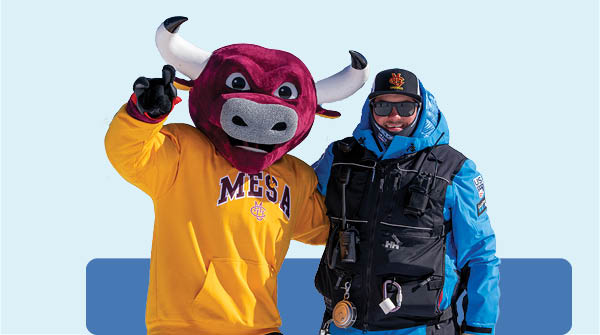When CMU’s Head Alpine Ski Coach Jesse Scott was named the United States Collegiate Ski and Snowboard Association (USCSA) Coach of the Year for 2023, he thought of his father.
“Getting this award is a tribute to my late dad,” he said, noting that his father was his biggest supporter when he was learning to ski and race. “He wasn’t a ski racer himself, but he thought there was something special about being a skier and wanted this for his children.”
Scott began skiing at age 2 and was racing by age 9. He closed out his junior racing career at age 17 and transitioned to coaching junior racers at Powderhorn Mountain Resort. In 2017, he was named CMU’s head alpine skiing coach.
This lifetime of experience was one of the factors USCSA emphasized when choosing him for this honor. USCSA also recognized Scott doesn’t just coach, but voluntarily takes a leadership role — administering races at the conference and national levels, assisting with the labor of setting courses, erecting safety netting, officiating and tackling the myriad of other tasks necessary to pull off a ski race.
CMU Club Sports Director Reese Kegans highlighted Scott’s profession as a mentor and counselor, and as an advocate for local suicide prevention efforts.
“Jesse is a good, genuine person who puts kids into leadership roles and empowers them to use their voices to make change,” said Kegans.
A mental health specialist at the CMU Student Wellness Center, Scott strives to blend his professional knowledge with his coaching in order to support each student-athlete where they are and at whatever level of competition they desire.
“I let the team members know that I’m here to provide instruction for the highest-level athlete in both techniques and tactics. But I also work with first-time racers introducing them to the sport,” said Scott. “I want ski racing to be a joyful thing for all of them.”
“Good coaching is not emotional, but objective and supportive, building off each athlete’s strengths,” Scott said. Noting that the starting area at a ski race is chaotic and stressful, Scott approaches each racer individually and asks, “What do you do really well?”
“You can really only think about one thing at a time as an athlete,” he explained, “So I tell them to focus on what they do really well and go do that during their run.”
Scott also encourages his student-athletes to learn more about “ski industry ins and outs” as they prepare for life beyond CMU. In cooperation with Powderhorn Mountain Resort, student-athletes can explore grooming and slope maintenance, ski instruction, adaptive skiing and snowboarding, and ski area management.
Scott maintains a relationship with Powderhorn Racing Club and provides opportunities for CMU racers to mentor these young athletes both on and off the snow.
“Ski racing is tough,” said Scott. “Racers acquire skills that not every athlete gets. Ski racing demands that athletes perform and execute right now, during the minute and a half it takes to complete a run. It takes a high level of motivation, athleticism and maturity.”
By helping his student-athletes develop these skills, Scott hopes they will also develop lifelong resilience and grit.
“Ski racing is a challenge you have to sit with and work through. It mimics life.”
